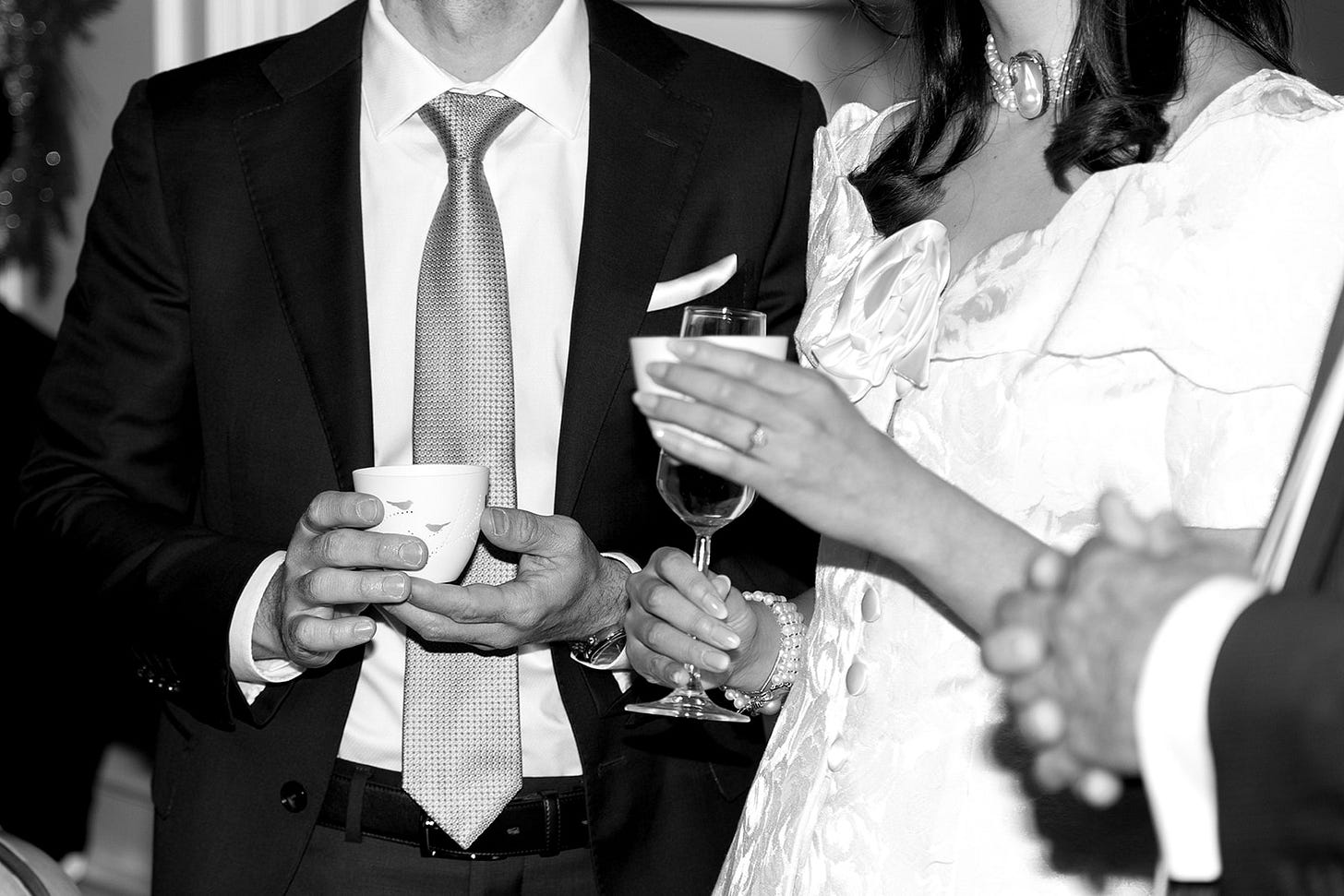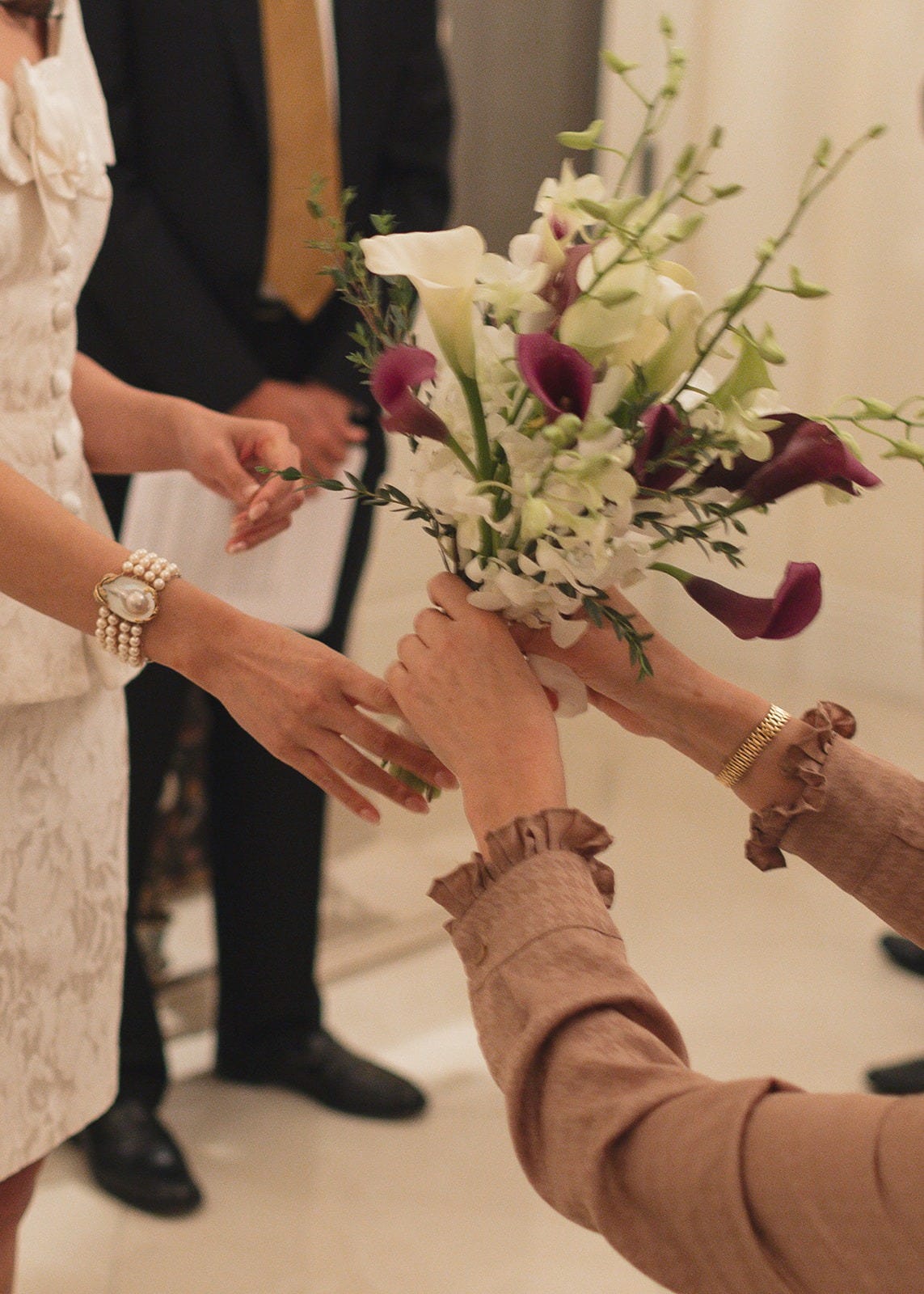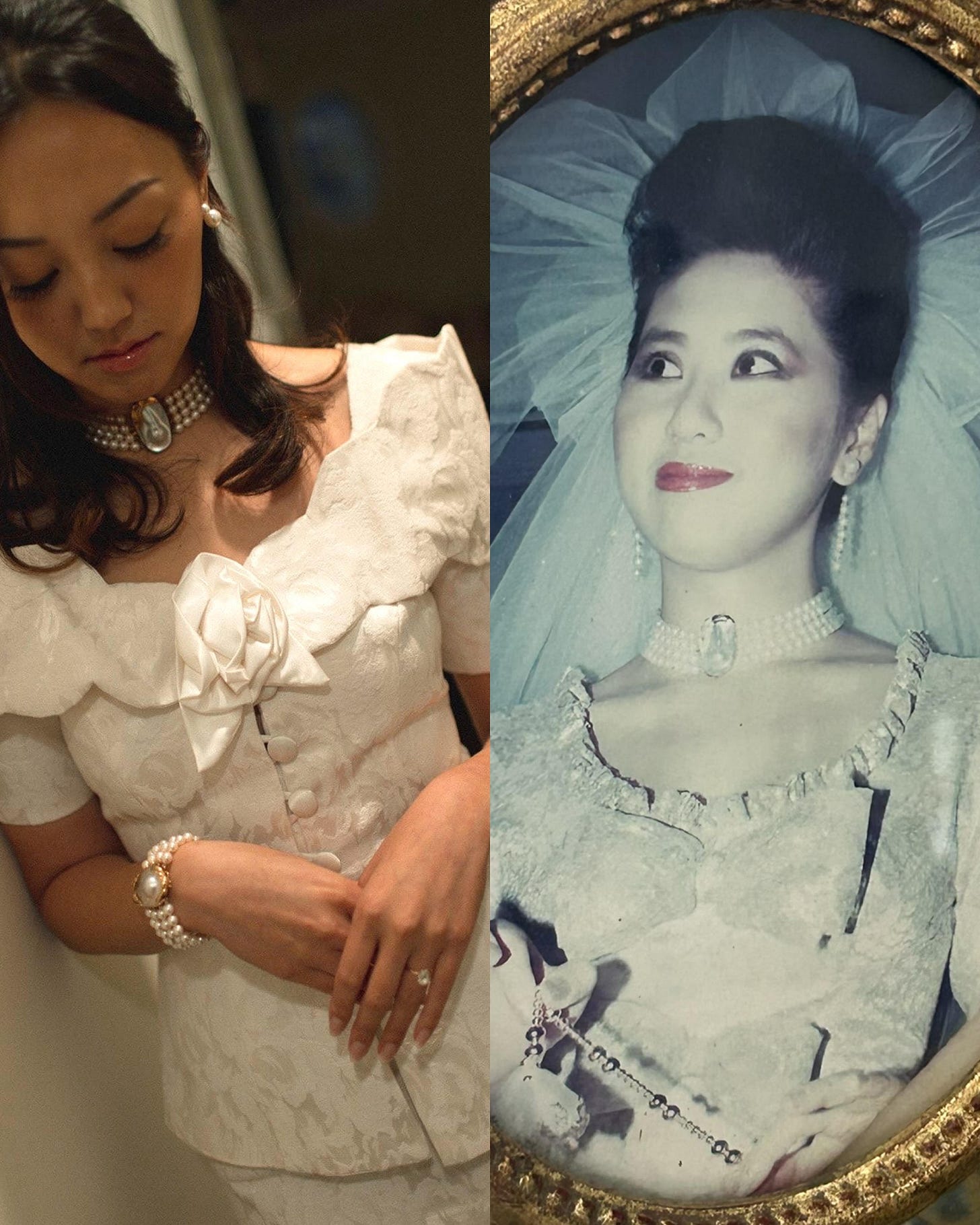The Day I Got Married
Fight at the flower stand, my bridal eBay find, day I will nev-er forget
For some, the day you get legally married is separate from your wedding. In this piece, I recount the day I got married through six vignettes. It was both a day like any other, and one I will never forget. If you enjoy my writing, consider becoming a free or paid subscriber. —FLD
Technically, Moritz and I had a four-month engagement. He proposed on the day of Trump’s attempted assassination, July 13, 2024, and my uncle, a newly minted member of The Universal Life Church, married us on Black Friday, November 29, 2024. Two unmemorable dates to most—withholding political zealots and savings-obsessed shoppers—but glamorous to us.
Leading up to November, I overlooked the significance of the day. Because we were planning a twelve-person gathering in my family home; because we had been cohabiting for a year and a half; and because the promise of spending the rest of our days in each other’s faces felt natural—obvious—I didn’t register it as the main event. The main event was our destination wedding six months later, where I’d wear a gown with a train, a harpist would introduce me to the crowd as “the bride,” and a photographer would close in on me like a hungry bird circling its prey. None of that has happened yet, and I’m sure it will feel big, but it won’t be the day I got married.
The day I got married, I woke up tired. I knocked on my mother’s bedroom door to summon her awake. My first errand was to acquire a bouquet to hold during the ceremony, and she agreed to come with me. She met me downstairs in a mood: groggy, bothered, unready.
“Do you want to at least brush your teeth?” I asked, slightly pissed. She exhaled deeply; I took a step back. I was the parent urging their child into the car—or else. Wasn’t this supposed to be my day? I thought. Could it not begin with a fresher face, fresher breath? She slouched upstairs. A few minutes later, we tried again.
“Let’s go,” she said buzzing past me.
We approached the flower stand on Pacific Coast Highway expressionless. We spoke reluctantly; we avoided eye contact. We weren’t much kinder to the flowers. My mother glazed over most. I studied individual stems checking for strength and vitality—many fell short. I considered variety after variety. Not right, not right. I wanted modern; my mother wanted traditional—with roses, probably. But I had a vision and I knew I could execute. This was floral design, not computer science, and I have enough art in my bones to make something decent. One by one I claimed calla lilies, of lavender and ivory, committing to placement on impulse and convincing myself it worked, like splattering paint against a blank canvas and intuiting a shred of cohesion. I toured my bouquet around the sidewalk, observing its angles, testing its form. I added. I subtracted, but never doubted myself. I behaved like a physician called in for surgery: blurry-eyed but confident.
“What do you think?” I asked my mother. I love posing questions I don’t need answers to. The flowers were mine to hold, not hers.The day I got married, my hair was a mess. I hired a makeup artist but skimped on a hairstylist, planning to use my expensive Dyson tool. Unfortunately, I forgot it in my apartment in San Francisco, hundreds of miles away. My mother had recently bought a knockoff—$50 from a sponsored ad—so we gave that a shot. I knew the result would be underwhelming; my “heavy Asian hair” according to her, needed volume, impossible to create without the right technique, tools, and products, none of which we had. But had I remembered my Dyson, I wouldn’t have been able to watch my life like a movie: The mother—willing, eager—stands behind her daughter hours before the ceremony begins, working on her hair. Their usual tension has settled into a quiet ease. The off-brand hair tool whirs. It’s not just about the hair. It’s about two people, a single mother and her only child, improvising together and hoping for the best—as they always have. The daughter sits at the vanity in a robe, surrounded by marble and soft light. The mother brushes, pinches, clamps, tugs. In the mirror, the daughter does not wince. She looks at her mother. Then herself. Then her mother again. She is looking at them both.
The day I got married, I didn’t see Mo until the ceremony. He was staying fifteen minutes away with his family at an Airbnb on Balboa Island. But, after noticing an old photo that sits on my dresser, I did text him:
The day I got married, the weather was overcast. Then, minutes before the ceremony: “Fendi, come to my room!” my mother cried.
I hurried over. Beyond her balcony were hues of gold and orange—sunlight erupting from beneath the clouds, descending behind Catalina Island and the ocean. It felt religious. Symbolic. How could it not? My mother took a few photos of me with the sunset—the wedding portraits that will go unframed—before heading downstairs to greet guests. Mo and his family would arrive any second. My task was to stay upstairs until the music started playing; that was my cue to enter. Until then, dolled up and ready to wed, I had nothing to do but meditate in the sunlight; I let the warmth envelope my face.
Throughout my twenties, I’ve documented select moments of great emotion—typically joy, but when the time comes to capture certain and yet inconceivable grief, I plan to capture that too. In my camera roll are stills taken moments after receiving good news. I’m in the middle of a busy crosswalk in Tokyo. In my bedroom in Los Angeles. In my car in San Francisco. I took a selfie here, too. A writer I admire once said: “Life is made in [the] pauses from ordinary life. When we acknowledge all we have and hope to be for each other.”The day I got married, I wore a $125 vintage skirt suit from eBay. It was substantial—not slinky—and charming with a boat neck, jacquard fabric, covered buttons, and a rosette placed right at the center of my chest. I love a thrifted find. The seller-provided measurements were a tad small for my body, but when I tried it on, it fit perfectly. I would spend restless weeks—months—deciding on my wedding gown, but mere minutes searching for what I would wear on the day I got married. Later in the evening, as I got into a car to drive to dinner, the skirt ripped down the middle. I laughed; it was snug after all. I shimmied the slit behind me and sat at the restaurant, cheeks to chair. No one had to know, but I told everyone anyway. How funny, I thought. A mishap that doesn’t count. It was too late! I was in the safe zone—already married! I had found love; love had found me! I know that marriage does not provide immunity against anything at all, but on that day I felt invincible.
The day I got married, I walked down the stairs to the song “Can’t Help Falling in Love” by Elvis Presley. At the bottom, I saw my uncle in a suit and tie. I saw Mo grinning like a man about to get married. I saw our families. In their hands, Mo’s parents held paper with the German translations of the ceremony. Did they think their son would move away? So far away? Speak a language in his day-to-day he struggled to learn in school? Live in California and marry a girl who doesn’t like the beach but uses the words “dude” and “vibes” unironically? Germans can’t pronounce “vibes” correctly; they say “wibes.” I can’t pronounce most German words correctly. Had they known, would they have been surprised? Tickled? Saddened? Toward the end of my uncle’s sermon, he recited a quote: Alte Liebe rostet nicht. It translates, roughly, to “true love never dies.”
The day after I got married, Mo and I drove to the cemetery to rest my bouquet at my grandfather’s grave. He passed away well before I was born, but according to others, he would have taken me to Disneyland, thirty minutes away, whenever I wanted. His name was Christopher. He was a hearty man, a world traveler, a smoker.
I wish I could have met him, learned from him. I wish I knew what he sounded like when he laughed, or was angry, or tipsy. If I could sit with him today, I’d ask if he was scared coming to America, what his favorite things were about my grandmother, what my mother and uncle were like growing up. I’d want to talk smack about the people we love: Why is he late to everything? Why does she have such a short temper? Has she always loved to control every little thing? I’d listen to his stories and answer his questions back to me as honestly as possible. I wonder if he’d be ashamed I don’t speak Chinese. I wonder if he’d think it was cool I lived in Japan. I wonder if he’d think I’m pretty. I know he would have loved me. Every person in my family—often to our detriment—cares too deeply. He couldn’t have been an exception.
Around Christmas in 1965, days after arriving in America, he and my grandmother got into a terrible car accident on the way to the chapel. Hoping to find a priest to wed them, eating popcorn as they drove, they tumbled down a hill. My grandmother broke her hip; she has a metal rod down her left side to this day. My grandfather went into a coma, then miraculously woke up four months later. Two years passed, and my mother was born. Two years after that, my uncle was born. Seventeen years later, Moritz was born, and five years after that, I was born.
Next Christmas, sixty years since the accident and one year since the day I got married, our photos—framed in gilded wood and surrounded by artificial light—will hang as ornaments on the tree. My grandmother, mother, and I will organize each, branch by branch.








You are the result of a medical miracle. One of the coolest parts of a wonderful story. Thanks for sharing.
Nice, and I LOVE Elvis's version of "Can't help falling in love."